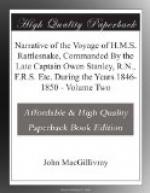The extent to which the numerals vary, the extent to which they agree, and the extent to which this variation and agreement are anything but coincident with geographical proximity or distance, may be seen in the following table:
English : one two three.
Moreton Bay : kamarah bulla mudyan.
Moreton Island : karawo poonlah madan.
Bijenelumbo : warat ngargark 2 + 1.
Limbakarajia : erat ngargark 2 + 1.
Terrutong : roka oryalk 2 + 1.
Limbapyu : immuta lawidperra 2 + 1.
Kowrarega : warapune quassur 2 + 1.
Gudang : epiamana elabaio 2 + 1.
Darnley Island : netat nes 2 + 1.
Raffles Bay : loca orica orongarie.
Lake Macquarie : wakol buloara ngoro.
Peel River : peer pular purla.
Wellington : ngungbai bula bula-ngungbai.
Corio : koimoil.
Jhongworong : kap.
Pinegorine : youa.
Gnurellean : lua.
King George Sound : keyen cuetrel murben.
Karaula : mal bular culeba.
Lachlan, Regent Lake : nyoonbi bulia bulongonbi.
Wollondilly River : medung pulla colluerr.
The Verb now requires notice. In languages in the same stage of development with the Australian the usual analysis, as shown by the late Mr. Garnett in his masterly papers on the structure of the verb, is as follows: 1. The root. 2. The possessive pronoun. 3. A particle of time—often originally one of place.
A rough illustration of this is the statement that such a word as dormur == sleep-my-then (or there). To apply this doctrine to the Kowrarega with our present data, is unsafe. Still, I am inclined (notwithstanding some difficulties) to identify the pa of the Present tense with the bu in kai-bu = now, and the n of the preterite with the n of che-na = there.
The double forms of the Past tense (one in n, and another in m) are at present inexplicable. So are the double forms of the Imperative, namely the one in r, and the one in e. It may, however, be remarked, that wherever the Imperative ends in e, the Preterite has the form in m; thus, pid-e = dig, pid-ema = dug. The only exception is the anomalous form peneingodgi = dived. This prepares the future grammarian for a division of the Kowrarega Verbs into Conjugations.
The last class of words that supply the materials of comment are the Substantives. Herein, the formation of the plural by the addition of le, probably occurs in several of the Australian tongues. I infer this from many of those words which we find in the vocabularies of languages whereof the grammar is unknown, and which are expressive of naturally plural objects ending in li, la, or l.
1. Star (stars)—pur-le, pi-lle, poo-lle, in Parnkalla, Aiawong, and Yak-kumban.
2. Fire (flames)—ka-lla, gad-la, in Western Australian and Parnkalla.
3. Head (hair)—kur-le, Encounter Bay. Here we learn from the forms kar-ga, from the Head of the Great Australian Bight, and ma-kar-ta, from Adelaide, that the l is foreign to the root.




